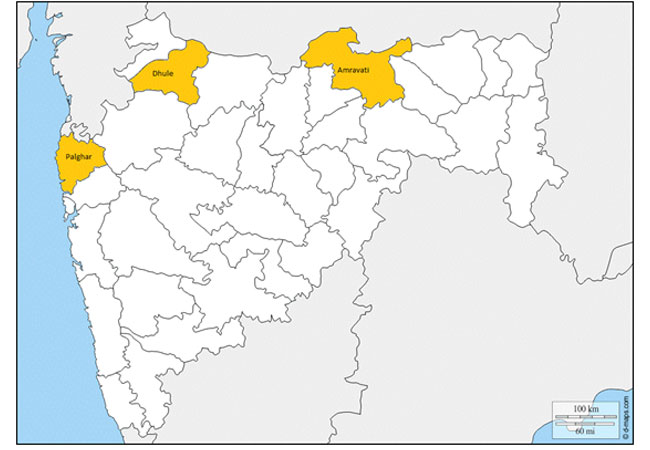
UTMT Society’s work in Maharashtra began in Peth and Surgana blocks of Nashik district in 2009 in partnership with BAIF MITTRA. Since then, it has expanded to Dhule, Amravati and Palghar districts. The area now has about 400+ beekeepers and a well developed ecosystem of beekeeping services including a cadre of Master Trainers (MTs), women beekeepers, Self-help Groups making inputs and village based Beekeeping Resource Centers for awareness generation and training.
Key Aspects
Women Beekeepers: Women beekeepers have broken gender stereotypes and shown immense potential in Dhule and Palghar districts. A grant from NABARD in 2014 was used to train women’s SHGs in Sakri block of Dhule district in beekeeping. This was further expanded through support from RBL Bank. Proficient women beekeepers promoted as Master Trainers (MT) are now providing beekeeping training to farmers in different districts of Maharashtra.
Kitchen Garden + Grey Water + Bees – A Drought Proofing Measure: An innovative approach of adding beekeeping to kitchen gardens to reduce farm distress during drought was piloted in Palghar district in 2018-19. Kitchen gardens using grey water (water used for washing vessels etc.) in combination with pollination support from bee boxes enabled households to grow vegetables for home consumption but local sales.


Impact Story: Bees + Kitchen Gardens = Winning Combination to combat Climate Change
Jani Ishwar Vaghat of Zari village, Talasari block of Maharashtra belongs to a farming family. Over the years, the output has declined due to persistent water scarcity in the area. Her husband has had to migrate as a construction laborer while she continues to look after agriculture.
In 2018, Jani Vaghat attended the farmer meeting being conducted by UTMT Society, wherein she was introduced to beekeeping and the bee flora programme. Convinced by the idea of beekeeping and the high quality seeds made available to her by paying only half the price, she signed up. She had a good harvest of vegetables for both self-consumption and sale, thanks to better pollination. She shares, ‘I had planned to go once a week to the local market, to sell the surplus harvest from the bee flora received. But instead I went every alternate day to sell the surplus produce, especially bottle gourd and earned Rs. 3,000/- only from its sale’. She also earned a good income by selling brinjal, sponge gourd and chillies in the local market. This was achieved through the combination of bee boxes + bee flora + use of grey water.
Jani Vaghat asserts, ‘Through income generated by selling bee flora surplus, I am able to meet the immediate emergency household expenditures. Even my children’s educational expenses are being taken care of easily. Earlier I had to work additionally as a laborer to meet these expenses’.She adds, ‘The beekeeping and kitchen garden programme has benefited not just me but my entire neighborhood in terms of reducing the expenditure on buying vegetables’.